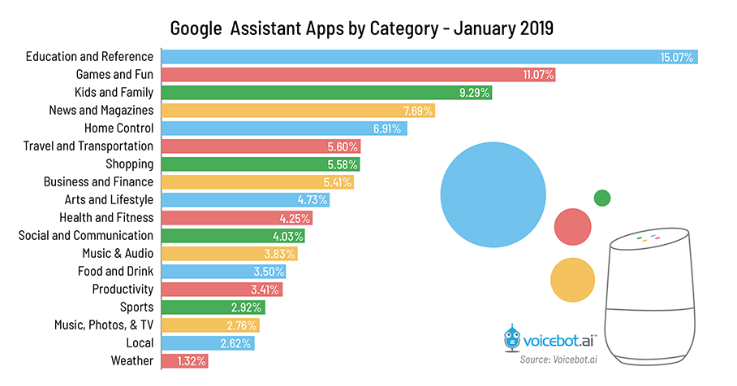Google Actions now total 4,253 in the U.S. compared with roughly 60,000 skills for Alexa as of last month, according to a new report by Voicebot.ai. There are 80,000 Skills overall.
But Skills and Actions are not as easy to discover or use as smartphone apps. And the platforms right now aren’t really helping.
David vs. Goliath. Google Assistant Actions and Alexa Skills are like Chrome extensions, or perhaps more appropriately, “voice apps.” Google Assistant and Amazon Alexa are both platforms third-party developers can build on, as with smartphone apps for Android and iOS.
Google itself says there are “over a million actions” for the Google Assistant but Voicebot says it has been tracking Google Actions’ growth since April 2017. According to the site, education is the largest category of Google Actions, followed by games. This is similar to Skills distribution, where games and trivia on Alexa represents 21 percent of skills (or more than 12,000),while education and reference has about 14 percent of the total.

Simplifying. Google and Amazon are trying to make it very easy to create voice apps. Google offers templates for actions. Similarly, Alexa Skills Blueprints now enable anyone to create a Skill “in minutes” without code and then publish them to the Alexa Skills store.
This is great for democratizing app development but may ultimately be bad for the platform if it adds more mediocre apps and noise.
Why you should care. Actions and Skills are critical tools to help make smart speakers and virtual assistants more utilitarian for consumers and more effective channels for brands and marketers. (Apple has also opened up Maps, Siri and iMessage to developers.) The challenges, as indicated, are discovery and quality.
There’s no easy or obvious place to find a directory of available Google Actions. If you ask Google Home, “Where can I find a directory of available actions?” it says, “My apologies, I don’t understand.” There are also multiple flaws in the Actions installation process. For its part, Amazon needs to bring down the hammer on low-quality skills or do a better job of surfacing the A-list.
There are potentially more than 100 million smart speakers in U.S. homes today and hundreds of millions of smartphones with virtual assistants. If virtual assistants are to realize their full potential Google and Amazon need to devote more attention to making Actions and Skills better and more easily accessible.
